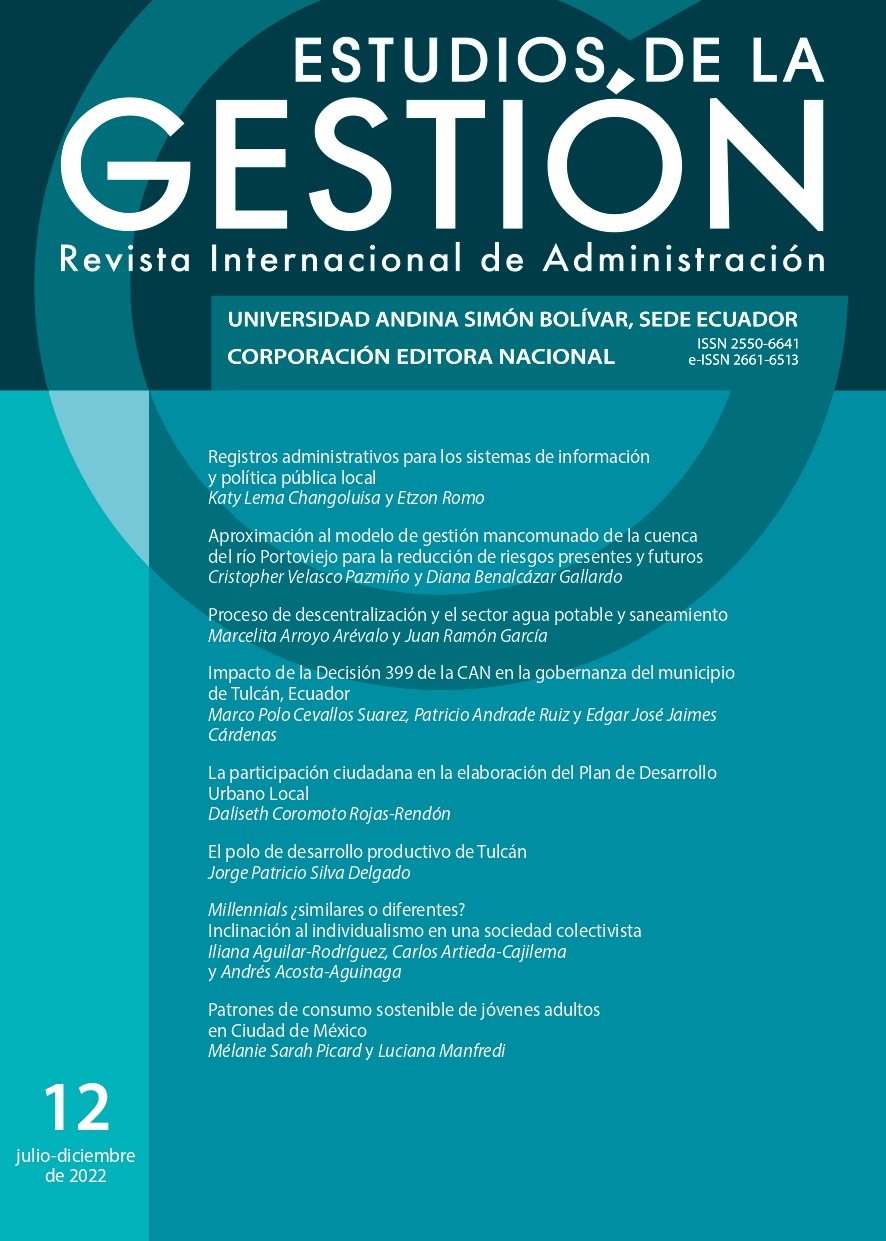Millennials ¿similares o diferentes? Inclinación al individualismo en una sociedad colectivista
DOI:
https://doi.org/10.32719/25506641.2022.12.9Palabras clave:
individualismo-colectivismo, millennials, cohorte generacional, cambio cultural, teoría de la modernizaciónResumen
Esta investigación buscó identificar si las culturas colectivistas pueden presentar tendencias individualistas según los cambios generacionales. Mediante encuestas personales se aplicó el instrumento VSM08 a una muestra de 390 millennials ecuatorianos y se utilizó la prueba de Kolmogorov-Smirnov, U de Mann-Whitney, Kruskal-Wallis y chi cuadrado de Pearson. Se evidenció que pueden existir cambios culturales en países colectivistas. Además, se encontró que existen diferencias entre hombres y mujeres de acuerdo con su edad y sector de ubicación. Los hombres y las mujeres más jóvenes son más individualistas y los hombres son menos individualistas en función al sector donde residen. Finalmente, se prueba que el IDV es un indicador válido a pesar de los cambios culturales.
Descargas
Referencias
Aguilar-Rodríguez, Iliana E., César A. Bernal-Torres, Juan C. Aldana-Bernal, Andrés G.
Acosta-Aguinaga, Carlos H. Artieda-Cajilema y Priscila Chalá. 2021. “Relationship Between Social Culture, Industry 4.0, and Organizational Performance in the Context of Emerging Economies”. Journal of Industrial Engineering and Management 14 (4): 750- 770. https://doi.org/10.3926/jiem.3560.
Álvarez-Berríos, Nora L., Isabel K. Parés-Ramos y Mitchell T. Aide. 2013. “Contrasting Patterns of Urban Expansion in Colombia, Ecuador, Peru, and Bolivia between 1992 and 2009”. Ambio 42 (1): 29-40.
Arnett, Jeffrey Jensen. 2010. “Oh, Grow up! Generational Grumbling and the New Life Stage of Emerging Adulthood-Commentary on Trzesniewski & Donnellan (2010)”. Perspectives on Psychological Science 5 (1): 89-92.
Atsawintarangkun, Pimnapa, y Takaya Yuizono. 2014. “How Different Cultures Affect OnlineCommunication on Knowledge Sharing between the Thais and Chinese”. Lecture Notes in Computer Science (Including Subseries Lecture Notes in Artificial Intelligence and Lecture Notes in Bioinformatics). Accedido noviembre de 2020: 523-533. https://doi.org/10.1007/978-3-319-07308-8_50.
Beugelsdijk, Sjoerd, Robbert Maseland y André van Hoorn. 2015. “Are Hofstede’s Culture Dimensions Stable over Time?”. Global Strategy Journal 5 (3): 223-240.
Beugelsdijk, Sjoerd, y Chris Welzel. 2018. “Dimensions and Dynamics of National Culture: Synthesizing Hofstede with Inglehart”. Journal of Cross-Cultural Psychology 49 (10): 1469-1505.
Bubany, Shawn T., y Jo Ida C. Hansen. 2011. “Birth Cohort Change in the Vocational Interests of Female and Male College Students”. Journal of Vocational Behavior 78 (1): 59-67.
Chang, Kyung-Sup. 2010. South Korea under Compressed Modernity. Familial Political Economy in Transition. Londres: Routledge.
Chao, Chin Chung, y Dexin Tian. 2011. “Culturally Universal or Culturally Specific: A Comparative Study of Anticipated Female Leadership Styles in Taiwan and the United States”. Journal of Leadership and Organizational Studies 18 (1): 64-79.
Cienfuegos-Martínez, Yessica Ivet, Alicia Saldívar-Garduño, Rolando Díaz-Loving y Alejandro Daniel Avalos-Montoya. 2016. “Individualismo y colectivismo: caracterización y diferencias entre dos localidades mexicanas”. Acta de Investigación Psicológica 6 (3): 2534-2543.
Czarnecka, Barbara, Bruno Schivinski y Serap Keles. 2020. “How Values of Individualism and Collectivism Influence Impulsive Buying and Money Budgeting: The Mediating Role of Acculturation to Global Consumer Culture”. Journal of Consumer Behaviour 4 (7): 1-18. 10.1002/cb.1833.
De Mooij, Marieke, y Geert Hofstede. 2002. “Convergence and Divergence in Consumer Behavior: Implications for International Retailing”. Journal of Retailing 78: 61-69.
EC Banco Central del Ecuador (BCE). 2019. Reporte trimestral de mercado laboral. Accedido noviembre de 2020. https://bit.ly/3h3Qgmm.
EC Instituto Nacional de Estadística y Censos (INEC). 2010. Censo de población y vivienda. Accedido septiembre de 2020. http://redatam.inec.gob.ec/.
---. 2012. Directorio de empresas y establecimientos contenido generalidades resultados. Accedido septiembre de 2020. https://bit.ly/3sEpwhC.
Gaganis, Chrysovalantis, Iftekhar Hasan, Panagiota Papadimitri y Menelaos Tasiou. 2019. “National Culture and Risk-Taking: Evidence from the Insurance Industry”. Journal of Business Research 97: 104-116.
Global Index. 2018. Generation Z Is More Likely to Spend Time Online via Mobile than Millennials. Accedido octubre de 2020. https://bit.ly/3gQi5yc.
Gorman, Phil, Teresa Nelson y Alan Glass. 2004. “The Millennial Generation: A Strategic Opportunity”. Journal of Organizational Behavior 12 (3): 255-270.
Grant, Gabriel B. 2017. “Exploring the Possibility of Peak Individualism, Humanity’s Existential Crisis, and an Emerging Age of Purpose”. Frontiers in Psychology 8 (1478): 1-11.
Grishchenko, Zhanna, y Larissa Titarenko. 2019. “Belarusian Millennials: A Generation Gap?”. Filosofija, Sociologija 30 (4): 317-324.
Grossmann, Igor, y Michael E. W. Varnum. 2015. “Social Structure, Infectious Diseases, Disasters, Secularism, and Cultural Change in America”. Psychological Science 26 (3): 311-324.
Hair, Joseph, Bill Black, William C. Black, Barry J. Babin y Ralph E. Anderson. 2010. Multivariate Data Analysis. Upper Saddle Nueva Jersey: Prentice Hall.
Hamamura, Takeshi. 2012. “Are Cultures Becoming Individualistic? A Cross-Temporal Comparison of Individualism-Collectivism in the United States and Japan”. Personality and Social Psychology Review 16 (1): 3-24.
Hofstede, Geert. 1983. “National Cultures in Four Dimensions. A Research-Based Theory of Cultural Differences among Nations”. International Studies of Management & Organization 13 (1-2): 46-74.
---. 2001. Culture’s Consequences: International Differences in Work-Related Values. Newbury Park: Sage.
---. 2008. Values Survey Module. Helsinki: Hofstede Center.
---. 2013. “Replicating and Extending Cross-National Value Studies: Rewards and Pitfalls–An Example from Middle East Studies”. Academy of International Business Insights 13 (2): 5-7.
Hofstede, Geert, y Gert Jan Hofstede. 2005. Cultures and Organizations: Software of the Mind. Nueva York: McGraw-Hill.
Hofstede, Geert, y Michael Minkov. 2013. Values Survey Module 2013 Manual. Helsinki: Hofstede Centre.
Hofstede, Geert, Gert-Jan Hofstede y Michael Minkov. 2010. Cultures and Organizations.Software of the Mind. Intercultural Cooperation and Its Importance for Survival. Nueva York: McGraw-Hill.
Hofstede, Geert, Gert-Jam Hofstede, Michael Minkov y Henk Vinken. 2008. Values Survey Module 2008. Helsinki: Hofstede Center.
Hong, Chan-Sook. 2017. “A Critical Argument against the Thesis of ‘Individualization without Individualism’: Focusing on a Comparison between Germany’s Sonderweg and South Korea’s Special Path to Modernization”. Korea Journal 57 (2): 102-128.
Howe, Neil, y William Strauss. 2000. Millennials Rising: The Next Great Generation. Nueva York: Vintage.
Huber, Brigitte, Matthew Barnidge, Homero Gil de Zúñiga y James Liu. 2019. “Fostering Public Trust in Science: The Role of Social Media”. Public Understanding of Science 28 (7): 759-777.
IBM, Corp. 2020. IBM SPSS Statistics for Windows, Version 25.0. IBM Corp. Armonk: IBM. Inglehart, Ronald. 1977. The Silent Revolution: Changing Values and Political Styles among Western Publics. Princeton: Princeton University Press.
---. 2007. “World Values Survey: The World’s Most Comprehensive Investigation of Political and Sociocultural Change”. Accedido agosto de 2020. https://bit.ly/34XgFQj.
Inglehart, Ronald, y Christian Welzel. 2005. Modernization, Cultural Change, and Democracy. The Human Development Sequence. Nueva York: Cambridge University Press.
Iyengar, Sheena S., Mark R. Lepper y Thomas Jefferson. 1999. “Rethinking the Value of Choice: A Cultural Perspective on Intrinsic Motivation”. Journal of Personality and Social Psychology 76 (3): 349-366.
Kagitcibasi, Cigdem. 1994. “A Critical Appraisal of Individualism and Collectivism: Toward a New Formulation”. American Psychology Association 18: 52-65.
Kramer, Thomas, Suri Spolter-Weisfeld y Maneesh Thakkar. 2007. “The Effect of Cultural Orientation on Consumer Responses to Personalization”. Marketing Science 26 (2): 246-258.
Malikhao, Patchanee, y Jan Servaes. 2011. “The Media Use of American Youngsters in the Age of Narcissism: Surviving in a 24/7 Media Shock and Awe - Distracted by Everything”. Telematics and Informatics 28 (2): 66-76.
Massry-Herzallah, Asmahan, y Khalid Arar. 2019. “Gender, School Leadership and Teachers’ Motivations: The Key Role of Culture, Gender and Motivation in the Arab Education System”. International Journal of Educational Management 33 (6): 1395-1410.
Minkov, Michael. 2007. What Makes Us Different and Similar: A New Interpretation of the World Values Survey and Other Cross-Cultural Data. Sofia: Klasika I Stil.
---. 2018. “A Revision of Hofstede’s Model of National Culture: Old Evidence and New Data from 56 Countries”. Cross Cultural and Strategic Management 25 (2): 231-256.
Moore, Robert L. 2005. “Generation Ku: Individualism and China’s Millennial Youth”. Ethnology 44 (4): 357-376.
Offermann, Leen R., y Peta S. Hellmann. 1997. “Culture’s Consequences for Leadership Behavior: National Values in Action”. Journal of Cross-Cultural Psychology (28): 342-351.
Páez, Darío, y Elena Zubieta. 2005. “Dimensiones Culturales: Individualismo-Colectivismo Como Síndrome Cultural”. En Psicología Social, Cultura y Educación, editado por Itziar Fernandez, Silvia Ubillo, Ellena Zuvieta y Darío Páez, 55-72. Madrid: Pearson.
Powell, Thomas. 1992. “Organizational Alignment as Competitive Advantage”. Strategic Management Journal 13 (2): 119-134.
Rojas, Ronald R. 2019. “Cultural Influences on Latin American Perceptions of Inclusion and Diversity”. International Journal of Organizational Diversity 19 (1): 45-61.
Sachs, Jeffery. 2005. The End of Poverty: How Can We Make It Happen in Our Lifetime. Londres: Penguin.
Sanjeev P. Sahni, y Garima Jain. 2018. “Internet Infidelity: An Interdisciplinary Insight in a Global Context”. En Cultural institutions in new technology: Evidence from Internet Infidelity, editado por Padmanabha Ramanujam, Yugank Goyal y Sriya Sridhar, 45-67. Singapur: Springer.
Shkodriani, Gina M., y Judith L. Gibbons. 1995. “Individualism and Collectivism among University Students in Mexico and the United States”. Journal of Social Psychology 135 (6): 765-772.
Sinha, Jai B. P. 2014. Psycho-Social Analysis of the Indian Mindset. Nueva Delhi: Springer.
Solomon, Michael R. 2008. Comportamiento del consumidor. Ciudad de México: Pearson.
---. 2013. Comportamiento del consumidor. Ciudad de México: Pearson.
Stankiewicz, Janina, y Patrycja ?ychmus. 2017. “Corporate Core Values and Professional Values of Generation Y from the Perspective of the Effectiveness of Ethics Programs”. Management 21 (1): 95-110.
Stevanin, Simone, Alvisa Palese, Valentina Bressan, Katri Vehviläinen-Julkunen y Tarja Kvist. 2018. “Workplace-Related Generational Characteristics of Nurses: A Mixed-Method Systematic Review”. Journal of Advanced Nursing 74 (6): 1245-1263.
Tarhini, Ali, Kate Hone, Xiaohui Liu y Takwa Tarhini. 2017. “Examining the Moderating Effect of Individual-Level Cultural Values on Users’ Acceptance of e-Learning in Developing Countries: A Structural Equation Modeling of an Extended Technology Acceptance Model”. Interactive Learning Environments 25 (3): 306-328.
Tung, Rosalie L., y Alain Verbeke. 2010. “Beyond Hofstede and GLOBE: Improving the Quality of Cross-Cultural Research”. Journal of International Business Studies 41 (8): 1259-1274.
Ulla, Kontio, y Tapio Petri. 2017. “Four Mexican Dreams: What Will Drive the Mexican Millennial to Invest?”. Futures 93: 89-101.
United Nations. 2019. “Department of Economic and Social Affairs. Population Dynamics”. Word Unrbanization Prospects 2019. Accedido febrero de 2021. https://population.un.org/wup/Country-Profiles/.
United Nations Development Programme. 2008. Assessment of Development Results-Valuation of UNDP Ecuador. Accedido marzo de 2021. https://bit.ly/3LMbIuj.
Voronov, Maxim, y Jefferson A. Singer. 2002. “The Myth of Individualism – Collectivism: A Critical Review”. The Journal of Social Psychology 142 (4): 461-480.
Welzel, Christian. 2013. Freedom Rising: Human Empowerment and the Quest for Emancipation. Nueva York: Cambridge University Press.
Yamagishi, Toshio. 1988. “Exit from the Group as an Individualistic Solution to the Free Rider Problem in the United States and Japan”. Journal of Experimental Social Psychology 24 (6): 530-542.
Zachara, Ma?gorzata. 2020. “The Millennial Generation in the Context of Political Power: A Leadership Gap? ”. Leadership 16 (2): 241-258.
Zhou, Chan, Wai Ying Vivien Yiu, Michael Shengtao Wu y Patricia M. Greenfield. 2018. “Perception of Cross-Generational Differences in Child Behavior and Parent Socialization: A Mixed-Method Interview Study with Grandmothers in China”. Journal of Cross-Cultural Psychology 49 (1): 62-81.












